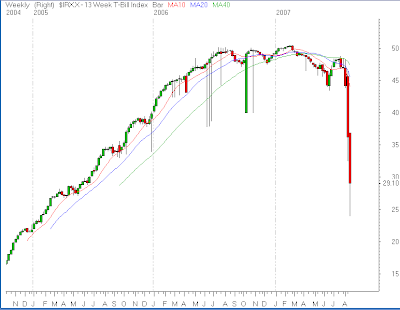Treasury bill (from wikipedia)
Treasury bills (or T-bills) mature in one year or less. Like zero-coupon bonds, they do not pay interest prior to maturity; instead they are sold at a discount of the par value to create a positive yield to maturity. Many regard treasury bills to be the most risk-free investment for U.S. investors. T-Bills are commonly issued with maturity dates of 28 days (or 4 weeks, about 1 month), 91 days (or 13 weeks, about 3 months), and 182 days (or 26 weeks, about 6 months). Treasury Bills are sold by single price auctions held weekly. Offering amounts for 13-week and 26-week bills are announced each Thursday for auction at 1:00 pm on the following Monday and settlement, or issuance, on Thursday. Offering amounts for 4-week bills are announced on Monday for auction the next day, Tuesday, at 1:00 pm and issuance on Thursday. Purchase orders at TreasuryDirect must be entered before 11:30 on the Monday of the auction. The minimum purchase amount is $1,000. (This amount formerly had been $10,000.) Mature T-bills are also redeemed on each Thursday. Banks and financial institutions, especially primary dealers, are the largest purchasers of T-Bills. They are quoted for purchase and sale in the secondary market on an annualized percentage yield to maturity, or basis. With the advent of TreasuryDirect, individuals can now purchase T-Bills online and have funds withdrawn and deposited directly to their personal bank account and earn higher interest rates on their savings. General calculation for yield on Treasury bills is
Yield = (Face Value – Price) * 360/Days %

This chart represents the yield on T-Bills, it is an inverse relationship to the actual price of the T-Bills which means T-Bills are in huge demand over the last 3 weeks.

